

Fairy Tales. Contemporary Fiction. Short Story. Women in Literature. Lecture 20 - The Classical Feminist Tradition. Syllabus for the Course: Feminist Theory. Feminist professors create an alternative to MOOCs. At first glance, "Feminism and Technology" sounds like another massive open online open course.
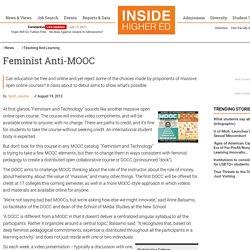
The course will involve video components, and will be available online to anyone, with no charge. There are paths to credit, and it's fine for students to take the course without seeking credit. An international student body is expected. But don't look for this course in any MOOC catalog. "Feminism and Technology" is trying to take a few MOOC elements, but then to change them in ways consistent with feminist pedagogy to create a distributed open collaborative course or DOCC (pronounced "dock"). Women's and Gender Studies. Syllabi for Women & Gender-Related Courses in Anthropology. 51 No Woman, No Revolution (half day) - CU2012-A. Crime and Punishment: Juvenile offenders study Russian literature. The idea of bringing Tolstoy to juvenile offenders is flat ridiculous to some, who think they need a tough wake-up call and practical job skills, not what they consider literary fluff.
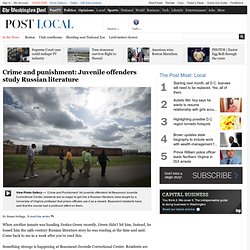
But the commonwealth spends nearly $80 million a year on juvenile correctional centers, and in recent years more than a third of the people released from those centers were convicted of another crime within a year. No one’s predicting a miracle cure for recidivism, a national problem. But there’s no cost to the Department of Juvenile Justice for the class. And staff members at Beaumont see a marked change in students’ behavior and goals with the class, said Michael Hall, the principal of the high school there. Some have gone on to college. Researchers have documented positive changes in behavior, decision-making, social skills, educational goals and civic engagement, according to a study by U-Va.’s Curry School of Education.
Kate Clanchy's top 10 coming-of-age novels. Do novels tell us anything about the ethical life that analytic philosophy cannot? Dilemmas, and the emotional insights and reactions that make up a great deal of lived human experience.
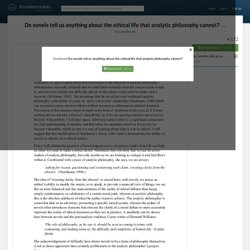
Does Great Literature Make Us Better People? The Stone is a forum for contemporary philosophers and other thinkers on issues both timely and timeless.
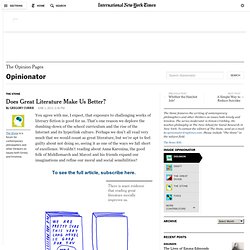
You agree with me, I expect, that exposure to challenging works of literary fiction is good for us. That’s one reason we deplore the dumbing-down of the school curriculum and the rise of the Internet and its hyperlink culture. Perhaps we don’t all read very much that we would count as great literature, but we’re apt to feel guilty about not doing so, seeing it as one of the ways we fall short of excellence.
Wouldn’t reading about Anna Karenina, the good folk of Middlemarch and Marcel and his friends expand our imaginations and refine our moral and social sensibilities? If someone now asks you for evidence for this view, I expect you will have one or both of the following reactions. What sort of evidence could we present? There is scant evidence that reading great literature morally improves us. The Blue Humanities. Although fully half of the world’s people now live within a hundred miles of an ocean, few today have a working knowledge of the sea.
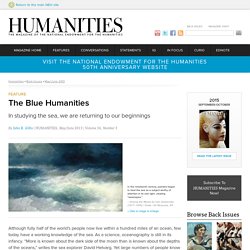
As a science, oceanography is still in its infancy. “More is known about the dark side of the moon than is known about the depths of the oceans,” writes the sea explorer David Helvarg. Yet large numbers of people know the sea in other ways, through the arts and literature. From the beginning of the nineteenth century, fiction has been imagining undersea worlds that explorers were unable to reach. ‘Animal Farm’: What Orwell Really Meant by George Orwell. IASC: The Hedgehog Review - Volume 15, No. 2 (Summer 2013) - The American Dream - Issue Introduction. The Hedgehog Review: Vol. 15, No. 2 (Summer 2013) Reprinted from The Hedgehog Review 15.2 (Summer 2013).
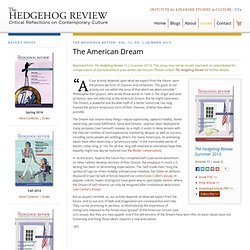
Losing Yourself: What The Secret History Tells Us About the Liberal Arts. I encountered Donna Tartt’s The Secret History the summer after my first year of college, as part of a grab bag of used but new-to-me books (along with poetry by Dickinson and Glück and Umberto Eco’s The Name of the Rose) passed on to me by an alumnus of my school who had enrolled as an English major a decade before I had.
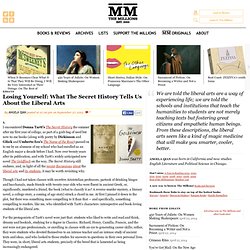
Now over twenty years after its publication, and with Tartt’s widely anticipated new novel The Goldfinch on the way, The Secret History still endures, and, in light of all the recent discussions about the liberal arts and its students, it may be worth revisiting why. Though I had not taken classes with secretive Aristotelian professors, partook of drinking binges and bacchanals, made friends with twenty-year olds who were fluent in ancient Greek, or, significantly, murdered a friend, the book (what to classify it as?
A reverse murder mystery, a literary novel, a college story, a coming of age story) struck a chord in me. Should Literature Be Useful? Two recent studies have concluded that serious literary fiction makes people more empathetic, and humanists everywhere are clinking glasses in celebration.
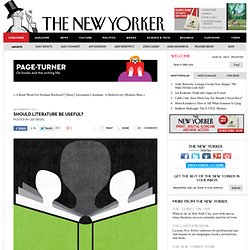
But I wonder whether this is a victory for humanism’s impalpable enrichments and enchantments, or for the quantifying power of social science. The two studies, one by a pair of social psychologists at the New School, and another conducted by researchers in the Netherlands, divided participants into several groups. The methodology was roughly the same in both studies. In the New School experiment, one group read selected examples of literary fiction (passages by Louise Erdrich, Don DeLillo, and others); another read commercial fiction, and another was given serious non-fiction or nothing at all. The subjects were asked either to describe their emotional states, or instructed, among other tests, to look at photographs of people’s eyes and try to derive from these pictures what the people were feeling when the photographs were taken.
Does reading actually change the brain? After reading a novel, actual changes linger in the brain, at least for a few days, report researchers.
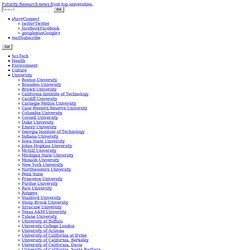
Their findings, that reading a novel may cause changes in resting-state connectivity of the brain that persist, appear in the journal Brain Connectivity. “Stories shape our lives and in some cases help define a person,” says neuroscientist Gregory Berns, lead author of the study and the director of Emory University’s Center for Neuropolicy. In Praise of (Offline) Slow Reading.
Andrew Moore's resource site home page - default. Andrew Moore died in 2006, aged 50.
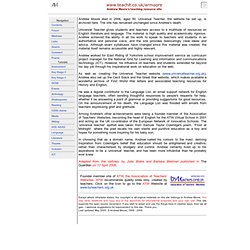
Universal Teacher, the website he set up, is archived here. The site has remained unchanged since Andrew’s death. Universal Teacher gives students and teachers access to a multitude of resources on English literature and language. The Complete Syllabus: Magic Shows by The Editors - Roundtable. The Editors Tags: books, education, libraries, readings, syllabus Ever wonder just how many books go into a single issue of Lapham's Quarterly? Follow along using this complete syllabus, which assembles all the fiction, non-fiction, poetry, and plays that produced this issue's readings.
What Books Do Writers Teach?: Zadie Smith and Gary Shteyngart’s Syllabi from Columbia University. Many, if not, most writers teach—whether literature, composition, or creative writing—and examining what those writers teach is an especially interesting exercise because it gives us insight not only into what they read, but also what they read closely and carefully, again and again, in order to inform their own work and demonstrate the craft as they know it to students. Let’s take two case studies: exemplars of contemporary literary fiction, both of whom teach at Columbia University.
I’ll leave it to you to draw your own conclusions about what their syllabi show us about their process. First up, we have Zadie Smith, author of White Teeth and, most recently, NW: A Novel. In 2009, Smith lent her literary sensibilities to the teaching of a weekly fiction seminar called “Sense and Sensibility,” for which we have the full booklist of 15 titles she assigned to students. See the list below and make of it what you will: Teachingliterature / Activities (generic activities) Free Online Literature and Study Guides.
Book-A-Minute Classics. Got another book report to do? English teachers have the inconsiderate habit of assigning mammoth-sized works of literature to read and then actually expecting you to do it. This wouldn't be so bad except that invariably the requisite reading is as boring as fly fishing in an empty lake. Half of those books don't even have discernible plots. And let's face it -- the Cliff's Notes are pretty time-consuming too.
Methods of poetry analysis. Thesis statements in lit papers exercise. Teaching Tip For A Literary Analysis Tool: Pattern Folders. NY/Arlington/MrBroomhead/AP-Poetry_Essays1-thru-2009.pdf. Invitation to World Literature. 0. Overview. Endymion (mythology) How to Choose Summer Reading for Students. Buddha in HoD.docx. Heart of Darkness: The 1909 Congo Exhibition - South Australian Museum. In the Heart of Darkness by Adam Hochschild. Beckett's 'Waiting for Godot' Beckett International Foundation. Why are we still waiting for Godot? 4 January 2013Last updated at 20:31 ET By Sean Coughlan BBC News education correspondent.
Why theatre has never been the same since Waiting for Godot. Teaching Law and Literature. Teaching Law and Literature. Teaching the Graphic Novel. Teaching the Graphic Novel. Bertolt Brecht Testifies Before the House Un-American Activities Committee (1947) Tragedy's decline and fall. S Bellow on Search for Symbols Misses All the Fun. Camus's "The Stranger": First-Line Translation. William Gibson on Why Sci-Fi Writers Are (Thankfully) Almost Always Wrong. Author William Gibson poses for a portrait at the Last Bookstore in Los Angeles.Photo: Jason Redmond/Wired. 'Hobbitses' and Frankenstein: how pop culture's words become official. Canon Fodder: Denouncing the Classics. The Fun Stuff: And Other Essays: James Wood: 9780374159566: Amazon.com. Elaine Showalter on my Guides to Theory. 2 Literary Criticism. The Simple Art of Murder R Chandler.
The Art of Criticism No. 1, Harold Bloom. Lear, Tolstoy and the Fool - Essay. “On Fairy-Stories” by J. R. R. Tolkien. Preface to Lyrical Ballads. Mr. Difficult. Notes on Writing Weird Fiction. Literary Theory. How To Deconstruct Almost Anything. On Murder Considered as One of the Fine Arts. The Critical Point.net Portal. Playtime (1967. Modernism Lab - Yale University. How to speak and write postmodern. The Endless Depths of Moby-Dick Symbolism - Joe Fassler. Colour Signatures of books. An Introduction to World Literature by a Cast Of Literary & Academic Stars (Free Course) The Neuroscience of Your Brain on Fiction. Reading Literary Fiction Improves Theory of Mind. Annals of overgeneralization. The American Literature Archive. A Winelike Sea. Around Alone.
Poetry! Shakespeare. Around the town. David Ferry's Beautiful Thefts. If you were Dante, who would you choose in place of Virgil as your guide through hell? : literature. Hell: Into everlasting fire. The Ultimate Self-Help Book: Dante's 'Divine Comedy' Our Friend David. Annotating the Hours of Ulysses: Stimulating the Seconds and Marking the Minutes. The Writer as Reader: Melville and his Marginalia. A Year in Marginalia: Sam Anderson. The Shirley Jackson Lottery Letters. Beyond Alice Munro: A Beginner’s Guide to Canadian Lit. Heart of Darkness - Fiction / Poetry - Books - Tin House. English Literature in Context. Literature and Ethical Values.